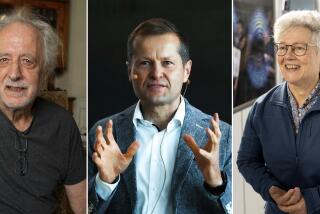Bertram Brockhouse, 85; Canadian Was Awarded Nobel Prize in Physics
- Share via
TORONTO — Bertram Brockhouse, who shared the 1994 Nobel Prize in physics with American Clifford Shull, has died after years of declining health. He was 85.
Brockhouse died Monday in Hamilton, Ontario, according to a Canadian press report. Brockhouse was an emeritus professor at McMaster University, about 40 miles southwest of Toronto. No cause of death was given.
Brockhouse and Shull were awarded the Nobel Prize for developing methods of neutron scattering techniques for studies of condensed matter.
Using beams of neutrons the way a microscope uses light, the researchers were able to reveal the structure and movement of atoms. Essentially, Brockhouse and Shull helped answer the questions of what atoms are and what they do.
Shull died in 2001.
Brockhouse was the only one of Canada’s 14 Nobel Prize winners who was born, educated and completed his life’s work in the country.
“He was a heroic figure in our community and in material science,” said Bruce Gaulin, a professor of physics at McMaster, who holds a research chair named in Brockhouse’s honor.
Brockhouse was born in Lethbridge, Alberta, and served as a military electrical technician during World War II. He obtained degrees in math and physics at the University of British Columbia and the University of Toronto. He is survived by his wife, Doris; six children; and 10 grandchildren.
Brockhouse carried out his research after World War II at some of the first nuclear reactors.
Ironically, Brockhouse and Shull were never interested in nuclear power. They merely used the primitive research reactors to study how neutrons are scattered when bouncing against atoms.
The groundbreaking research led several governments and institutions to pour billions of dollars into special facilities for neutron scattering. Researchers now use neutron scattering to study virus and DNA molecules.
Even after winning the Nobel, Brockhouse maintained a wonderful humility, Gaulin said.
“I remember him speaking at an undergraduate physics conference at McMaster just after the Nobel Prize was announced. He started off by saying that he used to believe his work wasn’t very important but that he might have to change his mind.”






